Margaret Stawowy, like most, wanted to keep her mother in familiar surroundings when she began to decline. It was easier said than done.
For five years, I provided care for my mother who experienced dementia. My mother lived in low-income senior housing, and I wanted to keep her in her familiar setting for as long as possible. I thought surely there were programs and safety nets for people on limited incomes like my mother. We lived in one of the most affluent counties in California. I quickly realized that I was both her “program” and “safety net.”
As a person with a full-time job, this was a daunting responsibility. Working with a non-profit social worker, I tried to get my mother the assistance she needed since I couldn’t be with her all day. For more than a year, I was unsuccessful until another social worker in private practice showed me what I was doing wrong and helped me apply successfully. If somebody like me with a college degree couldn’t apply without professional direction, how were struggling elders without children to assist them faring?
Towards the end, when my mother experienced debilitating falls, when I realized I could no longer keep her safe, when her behavior became erratic and violent, I implored her doctor for advice. She recommended my mother for hospice. Then and only then, my mother and I were able to get more services, otherwise unavailable.
I learned firsthand, that a large part of our healthcare system depends upon family members to provide unpaid caregiving, with scant direction or meaningful support.
